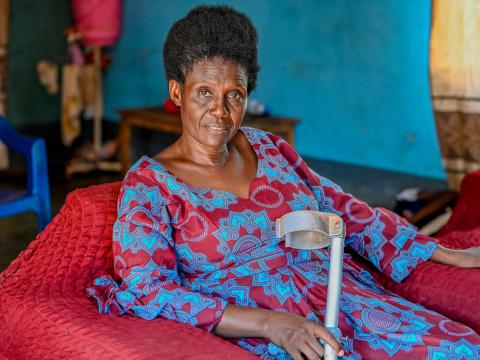DR Congo: Myriam Nongo is Quietly Transforming Lives through Her Renewed Vision for Change

By Tatiana Ballay, Communications officer
In the semi-urban commune of Fungurume, in the Lualaba province of southern DRC, lives Myriam Nongo, a 54-year-old woman whose life reflects resilience, purpose, and unwavering dedication to people with disabilities. Since 2009, she has lived in Kabila 2—a remote area marked by a lack of water, electricity, and basic services. Yet in this challenging environment, Myriam shines as a beacon of compassion and initiative.
Married to Étienne since 1995, with whom she shares four children, Myriam also cares for seven orphans. In 2016, she founded and began coordinating the Fungurume Association of Persons with Disabilities, which today has over fifty members.
“I used to believe I was incapable because of my disability. Today, I’m standing tall and moving forward”, said Myriam Nongo
Her home has long served as a refuge, having welcomed nearly 18 orphaned children over the years. In her neighborhood, solidarity is subtle but strong.
“Life here isn’t easy, but there’s a certain peace. Everyone lives humbly and respects their neighbors.”
In 2023, Myriam took part in a training by World Vision based on the Empowered World View (EWV) approach. This training, focused on mindset transformation, self-belief, and economic empowerment, marked a turning point in her life. She began seeing herself differently—not as a victim, but as someone equipped with everything needed to succeed.
“This training sparked a positive rebellion in me. I realized God had already given me everything: intelligence, strength, ideas. I just needed to believe in myself.”
Putting her new mindset into action, she launched a small donut business with just 80,000 FC (USD 32). Using basic ingredients, she prepares and sells up to 300 donuts daily at 200 FC each (USD 0.08), earning around 60,000 FC (USD 24) per day. After expenses, she saves about 10,000 FC (USD 4) daily storing her money in a reused plastic bottle and encouraging her children to adopt similar saving habits.
“I started small, but with discipline and faith, I know I can go far.”
To diversify her income, she recently purchased ten chicks. Although she’s learning poultry farming as she goes, she views it as an investment in the future. Monthly expenses remain a burden, but she’s determined to build sustainability.
Myriam hasn’t kept her progress to herself. She formed a solidarity group of eight women, all living with disabilities, who contribute weekly savings from as little as 2,000 to 20,000 FC (USD 0.80 to 8). Together, they’ve launched micro businesses selling charcoal, maize, and tailoring clothes.
“We may be disabled, but we refuse to depend on others forever. We are capable of taking action.”
One member, a woman with albinism, began selling maize and charcoal and can now feed her family daily. Another, who purchased a sewing machine, is not only making a living but also training two young girls.
What started as a small support circle has become a powerful engine of dignity and inclusion, especially under Myriam’s guidance.
But she dreams even bigger. She and her group hope to acquire an incubator for chick production and a freezer to store their goods, enabling them to scale their activities despite irregular electricity. Most importantly, Myriam envisions creating a center for children with disabilities a safe place for learning, growth, and dignity.
“If we build this center, these children won’t have to go through what we did. They’ll have a real chance to build a life with dignity.”
Her inspiration partly comes from a biblical story she encountered during EWV training, 2 Kings chapter 4. It reminded her that solutions often come from within and that faith must be accompanied by action.
“Faith means believing we’ve already received. So I act. I want people to one day say: ‘Myriam did this.’”
Today, despite limited means, she’s transforming her modest home into a hub of productivity. One room houses chicks; another is used to learn soap-making. Her home is now a space for work, advice, and community bonding.
Her journey illustrates the core of the Empowered World View: helping individuals reclaim their dignity, believe in their God-given potential, and see themselves as agents of change.
For Myriam, that change began personally, extended to her family, and now radiates through her community. Her determination has inspired others with disabilities to rise above marginalization.
“What I’ve learned, I won’t keep for myself. If I did it, we all can.”
Her story is proof that empowerment doesn’t require wealth; it begins with a shift in mindset, the power of community, and belief in a better future. Through one training, a once-overlooked woman discovered she could lead, uplift, and transform not only her own life but the lives of many around her.